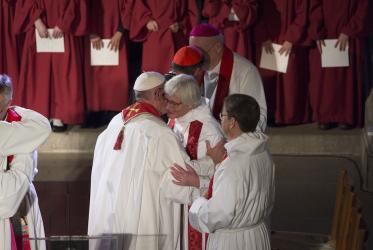Displaying 61 - 80 of 129
“Overcoming economic injustice” vision of WCC’s Athena Peralta
23 February 2017
Plans for 2017 decided by WCC Executive Committee
01 December 2016
El Comité Ejecutivo del CMI aprueba los planes para 2017
01 December 2016
WCC Executive Committee commends Reformation dialogue
28 November 2016
El Comité Ejecutivo del CMI encomia el diálogo sobre la Reforma
28 November 2016
WCC Executive Committee issues statement on climate justice
25 November 2016
New videos help congregations hasten HIV response
20 October 2016
GEM school ends with hope for a better tomorrow
08 September 2016
A just financial and economic architecture is possible, students find
08 September 2016
New Executive Committee members elected in Trondheim
28 June 2016





